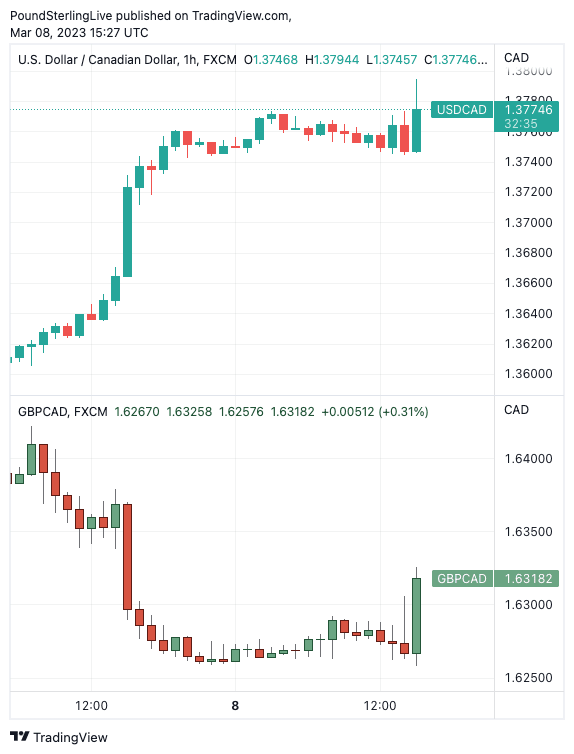Canadian Dollar: Further Falls "Inevitable" Following Bank of Canada's 'Dovish' Hold
- Written by: Gary Howes
- Bank of Canada holds interest rates at 4.5%
- Signals no intention to restart hikes
- CAD softer
- Further losses "inevitable" - CIBC Capital Markets.

Above: File image of Governor Tiff Macklem. Source and copyright: Bank of Canada.
The Bank of Canada opted to keep interest rates unchanged at its latest policy meeting and gave little indication that it will need to hike again in the near future, a decision that could fuel further Canadian Dollar weakness over the coming days and weeks.
In what can be described as a 'dovish hold' the central bank kept its key interest rates at 4.50% and released guidance that indicated rates would remain here for some time yet.
The Canadian Dollar weakened following the decision with the Pound to Canadian Dollar exchange rate (GBP/CAD) rising a third of a per cent to 1.6315 in the one-hour window following the decision.
Against the Dollar, the 'dovish' hold could be of greater consequence as USD/CAD is looking to extend its recent rally. At the time of writing the exchange rate is at 1.3790, its highest level since November 03.
The decision to hold interest rates in Canada comes a day after the Chair of the Federal Reserve warned more hikes were required south of the border, creating an interest rate divergence that would favour the U.S. Dollar over its Canadian counterpart.
"USD/CAD is higher, and it feels like a test of 1.38 is inevitable," says Bipan Rai, Head of FX Strategy at CIBC Capital Markets.
Compare GBP to CAD Exchange Rates
Find out how much you could save on your pound to Canadian dollar transfer
Potential saving vs high street banks:
C$4,450.00
Free • No obligation • Takes 2 minutes
In a statement, the Bank said economic growth came in flat in the fourth quarter of 2022, which was lower than it had projected.
It also signalled it was unlikely that rates would be hiked anytime soon, saying previous interest rate hikes were still making their impact felt:
"Restrictive monetary policy continues to weigh on household spending, and business investment has weakened alongside slowing domestic and foreign demand," said the statement.
"The Bank of Canada and Reserve Bank of Australia have failed to surprise markets with even the smallest morsel of hawkish commentary to go with their rate decisions," says Kit Juckes, Head of FX Research at Société Générale. "I can see no support coming for the yen, the Loonie or even the Australian dollar in the near-term."
The Bank nevertheless reiterated the labour market remains "very tight" as employment growth has been "surprisingly strong". This would be a key generator of domestic inflation, particularly as job vacancies remain elevated, and could possibly prompt the Bank to hike rates in the future again.
Above: USD/CAD (top) and GBP/CAD, showing CAD weakness in the wake of the 'dovish' hold at the BoC. Consider setting a free FX rate alert here to better time your payment requirements.
But, for now, the Bank expects this tight labour market to unwind somewhat over the coming months.
"With weak economic growth for the next couple of quarters, pressures in product and labour markets are expected to ease. This should moderate wage growth and also increase competitive pressures, making it more difficult for businesses to pass on higher costs to consumers," says the statement.
The Bank says the economy and data are evolving as expected, suggesting little reason to consider hiking interest rates again.
The Bank's economists forecast CPI inflation to fall back down to around 3% in the middle of this year.
"In the midst of a Fed-focused market freak-out, the Bank of Canada provided a more upbeat assessment of inflation as they opted to draw their tightening phase to an end. The widely expected freeze to interest rates came with a hope that inflation will allow them to maintain this neutral stance," says Joshua Mahony, an analyst at IG.
The statement reiterated a commitment by the Governing Council to continue assessing economic developments and the impact of past interest rate increases.
As such the Bank "is prepared to increase the policy rate further if needed to return inflation to the 2% target.
Regarding the Canadian Dollar's outlook, the Bank appears unwilling to fight the depreciation in its currency that would follow its decision to pause hiking.
"There was no direct mention of the Canadian dollar, which on a trade-weighted basis is now at its lowest level since mid-2020. As the market has reassessed terminal fed funds, it has also priced in significant odds of one more hike by the BoC later this year. But today’s policy statement did nothing to endorse that view, and the market reaction has been mildly dovish," says Josh Nye, Senior Economist at Royal Bank of Canada.
"While BoC-Fed policy divergence and related currency implications have been hotly debated, we do think the BoC is willing to tolerate a growing policy differential and would accept the weaker Canadian dollar," says Taylor Schleich, a strategist at National Bank of Canada.
Compare GBP to CAD Exchange Rates
Find out how much you could save on your pound to Canadian dollar transfer
Potential saving vs high street banks:
C$4,450.00
Free • No obligation • Takes 2 minutes





